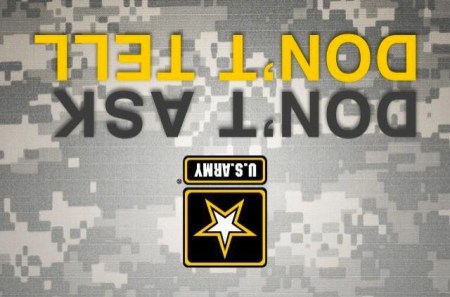
"Don't Ask, Don't Tell" is history
The Pentagon’s “Don’t Ask, Don’t Tell” policy dies today. It’s an obit I never thought I’d write. It hardly seems possible — as one who covered the debate for close to two decades — that the ban on openly gay men and women serving in uniform is passing into the pages of history. What will military reporters bored with hardware and budget stories write about for the next 20 years?
Actually, it should come as little surprise. The evolution of gays serving in the military traces the contours of public opinion pretty closely. The policy began life around the time of World War I, but wasn’t rigorously enforced until World War II. It was simply a presidential directive barring homosexuals from the ranks because that’s just the way things were.
When President Clinton unilaterally tried to lift the ban in 1993, a furious Congress passed a law barring openly gay men and lesbians from serving because, well, that’s just the way things were. So it seems only fitting, in 2011, that Congress has repealed the law and the Pentagon has declared it won’t affect military readiness because…that’s just the way it is. “We are prepared for repeal,” Pentagon press secretary George Little said Monday. “The force is well aware that this is coming. They’ve had the training. It’s been in the press for months. The September 20th day is not a mystery.” Defense Secretary Leon Panetta and Admiral Mike Mullen, chairman of the Joint Chiefs of Staff, will discuss the topic when they meet with reporters Tuesday afternoon.
(READ: How the End of ‘Don’t Ask, Don’t Tell’ Will Change the U.S. Military)
The public mood has made the change possible, and both advocates and opponents of the change should understand that. It won’t mark a big deal for most gays in uniform (including Battleland‘s own Officer X). Many have no intention of coming out of their barracks’ closet. Most have never wanted to come out — they just wanted the fear that shadowed them gone.
And it won’t create the dire scenarios predicted by the opponents: macho soldiers turning murderous because some gay GI has eyed them strangely. Here’s betting it will confirm what those of us who have covered the military for more than a war or two understand: soldiers respect one another primarily for their ability to accomplish their assigned mission.
Yes, there are outliers in the military, just like everywhere else. There will be some zealots on each side of this issue, and there will likely be nasty incidents that will attract the attention of the press like moths to a flamethrower. But they will garner attention — well out of proportion to their impact — because they will be the exception, rather than the rule.


